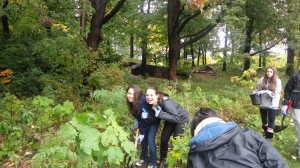 It started as a department brainstorm to promote Physical Education at LCC, and get students to think of fitness and health outside of classes. in the time that followed, several possibilities were considered, but the “cool” factor of a Guinness World Records® attempt won out. The process began about a year ago with an application to the Guinness Head Office in London.
It started as a department brainstorm to promote Physical Education at LCC, and get students to think of fitness and health outside of classes. in the time that followed, several possibilities were considered, but the “cool” factor of a Guinness World Records® attempt won out. The process began about a year ago with an application to the Guinness Head Office in London.
The ensuing time seemed like forever, as we waited for the Guinness organization to research and consider what until then had never been attempted as a record. In the hope of a timely response, a date was pried into the LCC schedule for the spring of 2010. However, the answer came only after the scheduled date, and we had to push our date with history to the fall.
The response was not without its criteria. The Guinness World Records® people insisted on a number of standards in order to even consider the record. First and foremost, the actual feat was determined. A minimum of 250 individuals had to complete the Bleep (as they call it) test, to Level 5, or 41 bleeps. Secondary to that, there were specific methodologies prescribed for counting, coordinating and running the event, as well as rules for how our record attempt was to be witnessed.
As the event approached, the logistics questions reared their ugly heads. The LCC schedule again had its say, the media was invited (but as of the day before the event, only one group had shown interest), the media lab was mobilized for the sound and video evidence and the maintenance department put down lines at a distance of 20m on our fields. Finally, our teachers and students were given their marching orders for the day. And of course the variable weather of a Montreal autumn was always in the back of our minds.
Answering our logistical concerns were our department heads who supported the initiative without reservation from the start, complete cooperation from the students, faculty, staff, and administration, and finally the expert, gentle shepherding of our competent Physical Education department (with a nod to mother nature for the spectacular fall day we were given.).
And the day was spectacularly successful. On a cloudless, warm, fall day on our LCC fields 443 people began the test and 324 people completed the Level 5 (41 beeps). We had achieved the feat, and as we collate our evidence to send to the Guinness World Records(R) Organization, we know we achieved the most important thing of all. It was fun to exercise together and exciting to talk about the possibility of being in the Record Book. And if our record is beaten, we could go out again, and still have fun… doing the beep (or “bleep”) test! –Steeve Lee, Physical Education Department Head



